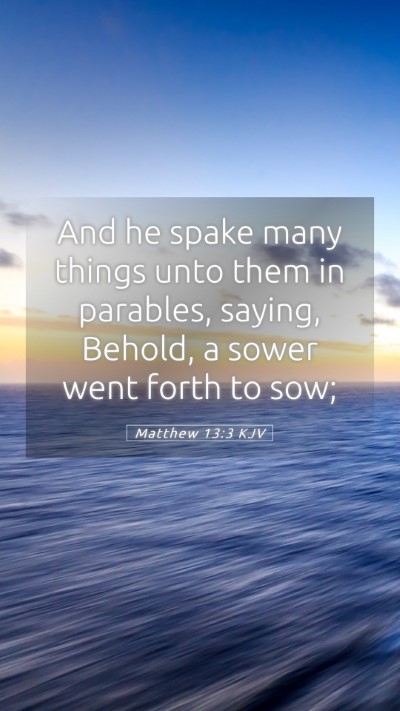Bible Verse Interpretation: Matthew 13:3
Verse Reference: Matthew 13:3 (KJV) - "And he spake many things unto them in parables, saying, Behold, a sower went forth to sow;"
Overview of Matthew 13:3
In this verse, we find Jesus employing parables as a teaching method. The parable of the sower is pivotal in understanding how the Word of God is received by various types of people.
Commentary on Matthew 13:3
-
Matthew Henry's Commentary:
Henry emphasizes the significance of parables in divine teaching, indicating that they are earthly stories with heavenly meanings. The act of sowing, which describes the spreading of the Gospel, is fundamental as it illustrates different receptions to God's Word.
-
Albert Barnes' Notes:
Barnes points out that the parable of the sower shows the different conditions of the heart that affect how people respond to God's message. He notes that "the seed" represents the Word of God, and the soil signifies various human responses, illustrating the need for self-examination in one’s reception of spiritual truths.
-
Adam Clarke's Commentary:
Clarke expands on the metaphor of the sower, identifying the various kinds of ground – wayside, stony, thorny, and good soil – and how they each symbolize a different class of hearers. This distinction highlights the importance of being receptive and prepared to accept the teachings of Christ.
Meaning and Significance of the Verse
This verse sets the stage for understanding the parable that follows, teaching us about receptivity to spiritual truths and the importance of being good soil for the seed of God's Word.
Interpretation of the Sower Parable
The story illustrates the various responses to Jesus’ teachings:
- Wayside: Represents those who hear the Word but do not understand; the enemy takes it away.
- Stony Ground: Symbolizes those who receive the Word joyfully but lack deep roots and quickly fall away under pressure.
- Thorns: Depicts those who hear the Word but are choked by worldly cares and riches.
- Good Ground: Stands for those who hear, understand, and bear fruit, representing true discipleship.
Application of Matthew 13:3 in Daily Life
Understanding this verse helps believers in self-reflection regarding their spiritual receptivity. It encourages individuals to cultivate their hearts to receive and act upon God's Word, fostering spiritual growth.
Connections to Other Scriptures
Matthew 13:3 can be further understood through the following cross-references:
- Mark 4:1-20: A parallel account of the parable of the sower, providing additional insights.
- Luke 8:4-15: Another version that elaborates on the heart conditions represented in the parable.
- James 1:21: An exhortation to receive the Word implanted, showcasing the importance of a receptive heart.
Conclusion
Matthew 13:3 serves as a profound initiation into the parables of Jesus, inviting readers to contemplate their own responsiveness to divine teachings. By analyzing this scripture through various commentaries, we gain deeper insights into the meaning of Bible verses and their application in our lives.
Further Study Recommendations
For those interested in Bible study groups or online Bible study, consider exploring Bible study tools and resources that focus on parables. Engaging in in-depth Bible verse analysis can enhance your understanding of Scripture and its application.
SEO Keywords:
- Bible verse meanings
- Bible verse interpretations
- Bible verse understanding
- Bible verse explanations
- Bible verse commentary
- Scripture analysis
- Biblical exegesis
- Bible study insights
- Meaning of Bible verses
- Understanding Scripture


